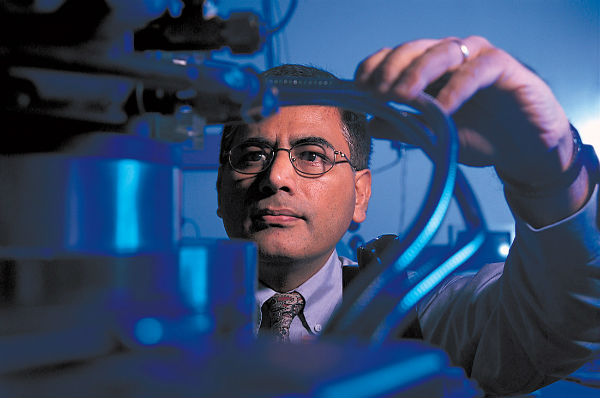Careers in Physics

Today, we are living in the early days of the Fourth Industrial Revolution, powered in part by artificial intelligence (AI), quantum science and quantum engineering. A convergence of physical, digital, mathematical, human and biological sciences is forcing companies across all industries to re-examine how they do business and what kinds of employees they hire. The department of Physics facilitates this convergence and prepares its students for 21st century careers.
Our program combines technical training with the development of 21st century skills like problem-solving, critical and creative thinking, imagination, collaboration, communication and ethical reasoning and mindset. This combination makes our graduates most competitive for high-demand, high-paying jobs in the science, technology, engineering, mathematics and medicine (STEMM) fields.
The Building (IT) Together report from Burning Glass Technologies, commissioned for the city of Birmingham by a consortium of local groups, has identified three main areas for economic growth and workforce development in our region: Advanced Manufacturing, Information Technologies and Life Sciences and Biotech. These recommendations also align with the Alabama Department of Commerce’s Accelerate Alabama 2.0 economic development plan for recruitment, development and workforce training. Our Physics hands-on research projects and faculty expertise let our students pursue highly sought-after experiences in materials science, lasers and photonics, advanced computation and high-tech instrumentation. These experiences are critical for STEMM jobs in Birmingham, Alabama, and across the nation.
With the demand for STEMM-skilled workers growing, physics graduates face a low rate of unemployment and a high rate of return on their educational investment. This increasing marketability helps physics students achieve their career goals in today’s global economy. And because physics is the basis for most modern technology, a physics degree gives students the flexibility to find a job in almost any field. Unlike in the past, less than 5% of Physics graduates now pursue careers as physics professors. The rest find excellent jobs in Engineering (30%), Computer and Information Systems (24%), other STEM areas (13%), and non-STEM areas including Medical professions (30%). Related careers include data science, medical research, financial and legal services, product design and development, computer programming and software development, education, and more.
Where do UAB Physics graduates find jobs?
Our recent graduates have gone on to work in a wide range of fields and at a variety of companies and institutions, including:
Research Laboratories
- Army Research Lab
- Carnegie Institution of Washington
- Johns Hopkins
- Lawrence Livermore National Laboratory
- Los Alamos National Laboratory
- NASA Jet Propulsion Laboratory, Ames Research Center and Goddard Space Flight Center
- National High Magnetic Field Laboratory
- Sandia National Laboratory
Education
- Berry College
- Birmingham Southern College
- King Abdulaziz University
- Kyungpook National University
- Morehouse School of Medicine
- Samford
- Troy University
- University of Mary Washington
- University of Montevello, AL
- University of West Georgia
Industry
- Accenture
- ALTAIR Center
- Analog Devices
- Avigo Solutions
- BBVA
- Brighton Science
- Cognizant
- Covalence
- Dynetics
- Electronic Warfare Associates
- Fujitsu
- Home Depot
- Huntsville Defense Industry
- Intel Corporation
- Inspiratherapeutics, Inc.
- IPG Photonics
- Kettering Health
- KLA
- Medicraft, Inc.
- Micron Technology
- MKS Instruments
- NASA
- Northrop Grumman
- NXP Semiconductors
- Orchid Orthopedics Solutions
- ProPlate
- Regions Bank
- Samsung
- SecurIT360
- Shipt
- Taiwan Semiconductor
- Vista Engineering
- Data Scientist positions in various companies
Graduate Programs
- Arizona State
- Berkeley
- Penn State
- Stanford
- University of California, Davis
- University of Colorado, Boulder
- Yale
Career Resources
Physics provides students with an excellent academic preparation for a variety of careers upon graduation, and there are many resources available to help you start or advance your career.
The University's Career Center is a great place to get started. The center provides information on employment opportunities, assists with job skill development including interviewing and resume writing, sponsors jobs fairs, and much more! We encourage all students considering a career in a STEM, medical, health, teaching, financial, or business-related field to explore the following resources:
- AIP: Career Resources
- Society of Physics Students
- HPS: Careers in Health Physics
- APS: Careers in Physics
- AIP: Employment Statistics
- Who's Hiring Physics Bachelor's?
- Why Study Physics?
- Where the STEM Jobs Are (and Where They Aren’t)
You can also research your job prospects through the Department of Labor's Occupational Outlook Handbook; revised every two years, it describes working conditions, training and education needed, and expected earnings and job prospects.
Frequently Asked Questions (FAQs)
Who Is Hiring Physics Bachelor’s?
A state-by-state listing of the many employers who recently hired physics bachelor’s into science and engineering positions.
Who Is Hiring Physics PhD’s?
Employer names, job titles, sectors, salaries, and skills frequently used of new physics PhDs by field of employment.
Latest Employment Data for Physicists and Astronomers
Reports that provide the latest data on where physicists work and what they do throughout the economy and at different degree levels.
Statistical Research Center Homepage
Current data on education and employment in physics, astronomy, and allied fields, including interactive resources, full reports, and individual graphs and tables.